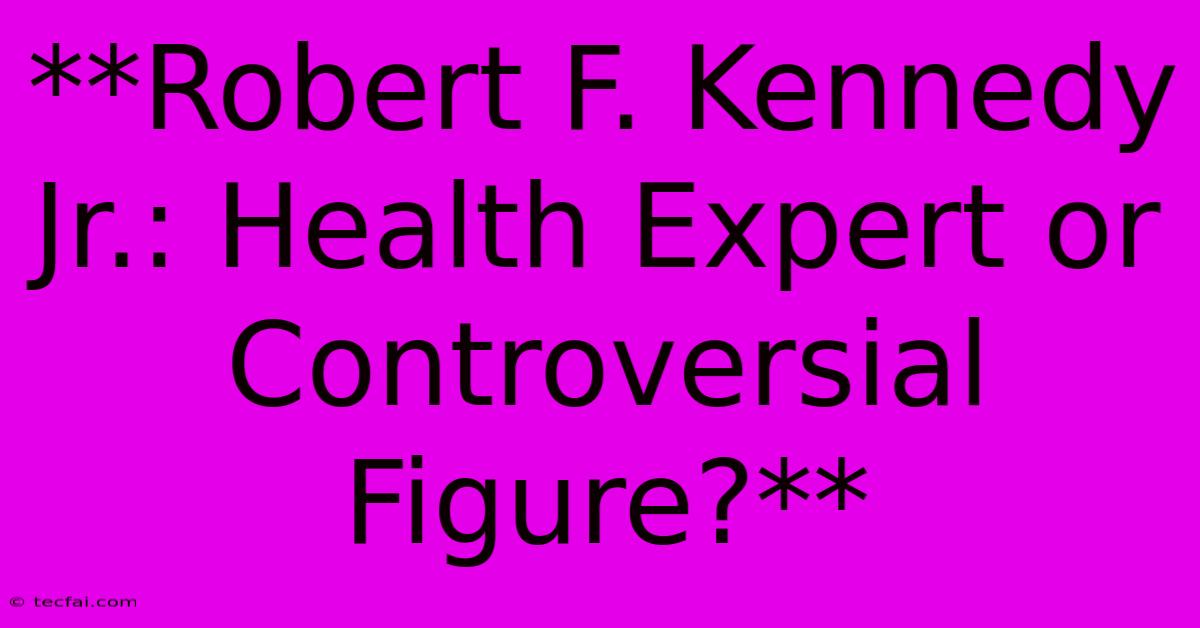**Robert F. Kennedy Jr.: Health Expert Or Controversial Figure?**

Discover more detailed and exciting information on our website. Click the link below to start your adventure: Visit Best Website tecfai.com. Don't miss out!
Table of Contents
Robert F. Kennedy Jr.: Health Expert or Controversial Figure?
Robert F. Kennedy Jr., the nephew of former President John F. Kennedy and son of the late Senator Robert F. Kennedy, is a prominent figure in the world of health and environmental activism. He has garnered a significant following for his outspoken views on a range of issues, particularly his vocal criticism of vaccination programs and his stance on environmental concerns. However, his views have also drawn intense scrutiny and controversy, leading to debates about his credibility as a health expert.
A Legacy of Public Service and Advocacy
Kennedy's legacy is deeply intertwined with his family's history of public service. His father, Robert F. Kennedy, was a prominent Attorney General and later a Senator known for his advocacy for social justice and civil rights. Kennedy himself has followed in his family's footsteps, dedicating himself to environmental activism through organizations like Waterkeeper Alliance, which he co-founded. He has also been a vocal advocate for the preservation of natural resources and for combating pollution.
The Vaccine Controversy: A Turning Point
While Kennedy's environmental work has been widely praised, his views on vaccines have ignited fierce debate. He has been a prominent voice in the anti-vaccine movement, raising concerns about the safety and efficacy of vaccines. He alleges that vaccines contribute to autism and other health issues, claims that are widely disputed by the scientific community. The Centers for Disease Control and Prevention (CDC) and the World Health Organization (WHO) have consistently stated that vaccines are safe and effective, and that there is no link between vaccines and autism.
The "Misinformation" Label and Its Consequences
Kennedy's anti-vaccine stance has earned him criticism from both the scientific community and public health officials. He has been labeled a "misinformation spreader" and his views have been deemed harmful by many, leading to concerns about the potential impact of his pronouncements on public health. The debate over vaccines has become highly politicized, with some arguing that Kennedy's pronouncements contribute to vaccine hesitancy and an increase in preventable diseases.
Navigating a Complex Landscape
The complexities of the vaccine debate are further compounded by the fact that Kennedy's claims are often presented alongside scientific evidence. He frequently cites research studies and scientific publications to support his arguments. However, his interpretations of these studies are often disputed by scientists, who argue that he selectively presents data and misinterprets findings.
The Need for Critical Evaluation
The controversy surrounding Kennedy's views highlights the importance of critical evaluation of information, particularly in the realm of health and science. While it is crucial to remain open to diverse perspectives, it is equally important to rely on evidence-based information and to avoid relying on anecdotal evidence or sensationalized claims.
A Complex Figure in a Polarized World
Robert F. Kennedy Jr. remains a controversial figure, his legacy forever intertwined with the complex and often contentious debate over vaccines. His environmental advocacy has earned him widespread respect, but his anti-vaccine stance has drawn considerable criticism. The ongoing debate surrounding his views underscores the importance of separating fact from fiction, and the need to engage in critical thinking when evaluating information, particularly in areas that profoundly impact public health.

Thank you for visiting our website wich cover about **Robert F. Kennedy Jr.: Health Expert Or Controversial Figure?** . We hope the information provided has been useful to you. Feel free to contact us if you have any questions or need further assistance. See you next time and dont miss to bookmark.
Featured Posts
-
When Is The Next Full Moon Supermoon
Nov 15, 2024
-
Rfk Jr Confirmed As Trumps Health Chief
Nov 15, 2024
-
Prepare For Cold Wintery Weather On The Way
Nov 15, 2024
-
Fbi Conducts Raid At Polymarket Ceo Home
Nov 15, 2024
-
Pentagon Transparency Lawmakers Seek Openness On Ongoing Efforts
Nov 15, 2024
